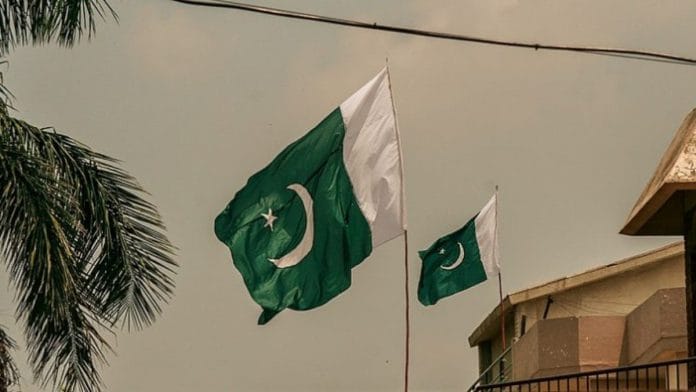Thank you dear subscribers, we are overwhelmed with your response.
Your Turn is a unique section from ThePrint featuring points of view from its subscribers. If you are a subscriber, have a point of view, please send it to us. If not, do subscribe here: https://theprint.in/subscribe/
Pakistan’s political system is in crisis. Decades of institutional dysfunction, systemic corruption, and the entrenchment of self-serving elites have pushed the country to the brink. This structural malaise has eroded public trust, stifled development, and perpetuated cycles of instability. Amid this turmoil, the rise of Imran Khan as a symbol of resistance offers a glimmer of hope, albeit amidst controversy and polarization.
At the heart of Pakistan’s political dysfunction is a feudal and dynastic structure that prioritizes elite preservation over public welfare. Political parties often serve as family enterprises, dominated by powerful clans whose primary interest lies in maintaining their grip on power rather than addressing the needs of the people.
Successive governments have been plagued by scandals involving misappropriation of public funds. Institutions meant to safeguard accountability, such as the judiciary and anti-corruption bodies, are frequently compromised or weaponized against political opponents.
The inability of the state to provide basic services like education, healthcare, and security has exacerbated inequality. Meanwhile, the military’s pervasive influence over civilian governance has further weakened democratic institutions.
Unsustainable borrowing, reliance on external aid, and a lack of coherent economic policies have left Pakistan teetering on the edge of economic collapse. This has disproportionately affected the poor, with inflation and unemployment reaching alarming levels.
The judiciary, often swayed by political pressures or military interests, has failed to act as an impartial arbiter. From approving coups to endorsing questionable disqualifications, its actions have contributed to the erosion of democracy.
Amid this grim landscape, Imran Khan emerged as a disruptive force challenging the status quo. His ascent was fueled by a populist narrative that resonated with a populace disillusioned by traditional politics. While his tenure as Prime Minister from 2018 to 2022 was marred by its own controversies, his post-ouster resistance has cemented him as a polarizing yet transformative figure.
Khan’s rhetoric against entrenched corruption struck a chord with ordinary citizens. His demand for greater transparency and accountability created a new political discourse centered around governance reform.
Khan’s appeal among Pakistan’s youth, who constitute a significant portion of the population, has been unprecedented. His ability to galvanize this demographic has injected new energy into Pakistan’s political landscape, sparking debates on issues like education, employment, and digital inclusion.
The prolonged incarceration of Imran Khan, Pakistan’s most prominent political figure, has cast a spotlight on the misuse of state institutions for political vendettas. His detention and the judicial maneuvers employed to extend it reveal deeper structural flaws in Pakistan’s political and judicial systems, raising troubling questions about the erosion of democratic norms and the weaponization of legal processes.
Since his ouster in April 2022, Khan has faced an unprecedented legal onslaught, with over 150 cases filed against him, ranging from corruption to terrorism charges. While accountability is vital for any democratic system, the selective targeting of Khan and his party, Pakistan Tehreek-e-Insaf (PTI), is a coordinated effort to neutralize him politically.
The charges against him have often lacked transparency, with trials conducted in opaque settings, including military courts. This approach undermines the rule of law and reinforces the perception that the judiciary and other state institutions are being used as instruments of political engineering.
Courts appear to have adopted a dual standard, expediting cases against Khan while delaying or dismissing similar allegations against his political rivals. This selective application of justice has diminished public trust in the judiciary’s impartiality. Khan has been repeatedly arrested, often under dubious circumstances and without adherence to proper legal procedures. His re-arrests after being granted bail illustrate the disregard for judicial orders and the rule of law.
Independent reporting on Khan’s detention has been heavily censored, with media outlets coerced into toeing the establishment’s line. This stifling of dissent undermines freedom of expression, a cornerstone of democracy.
Trying civilians, including Khan’s supporters, in military courts for alleged political offenses sets a dangerous precedent. It signals a retreat from civilian oversight and undermines the principle of open justice.
The continued imprisonment of Imran Khan has significant political, social, and institutional implications. Khan’s incarceration has deepened divisions within Pakistan. His supporters see him as a victim of state oppression, which fuels resentment and could lead to further unrest. The use of state institutions to silence political opposition undermines Pakistan’s democratic framework, setting a troubling precedent for future governments. The judiciary, police, and accountability bodies lose legitimacy when they are perceived as tools of political persecution. Restoring public trust in these institutions will be an uphill battle.
Khan’s resistance has become a rallying point for millions, and his plight underscores the broader struggle for justice and accountability in Pakistan—a struggle that must transcend individual leaders to create a system rooted in fairness and equality.
While Khan’s resistance offers a ray of hope, Pakistan’s political redemption requires systemic reform. The judiciary, Election Commission, and accountability bodies must operate independently and without bias. A clear separation of powers between civilian and military institutions is essential for sustainable democracy. A focus on self-reliance, diversification, and pro-poor policies is crucial for economic stability. Encouraging citizen participation and fostering a culture of political accountability can drive grassroots change.
Imran Khan’s journey symbolizes the aspirations of millions of Pakistanis yearning for a just and equitable system. For Pakistan to thrive, the resistance must evolve into a collective movement that prioritizes systemic change over political vendettas.
The road to reform is arduous, but as history shows, even the most entrenched systems can crumble under the weight of persistent and principled resistance. Pakistan stands at a crossroads, and the choices its leaders and citizens make now will shape its destiny for generations to come.
These pieces are being published as they have been received – they have not been edited/fact-checked by ThePrint.


